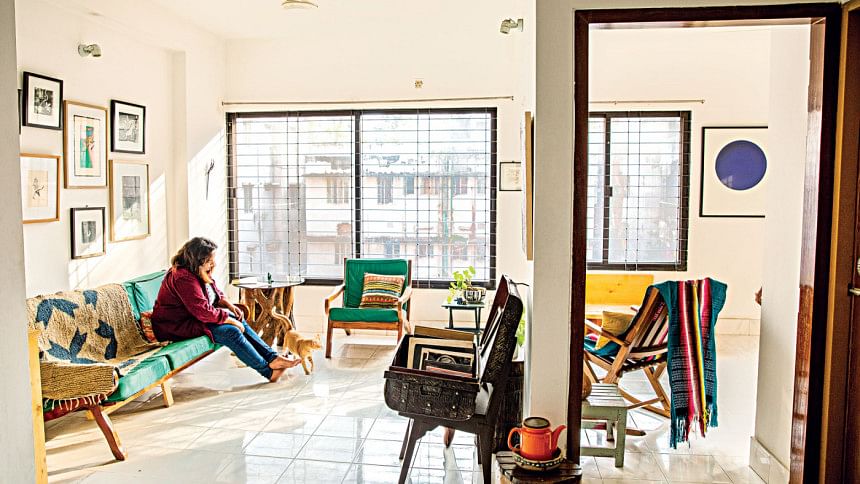Struggles of solo women in the big city

Brave, young, independent women are breaking stereotypes in the big cities to live with independence. But is it a bed of roses?
Last year during the pandemic lockdown, I watched a show on YouTube about a young Indian girl from the suburbs who moved to a big city to follow her dreams and talent in fashion design. It was not easy, of course, hailing from South Asian nuclear-family cultural roots. The struggles she had to face, starting from relaying the decision as a doting only daughter to an Army father, felt too close to home. Welcome to a fast-growing niche new wave of Bangladeshi — slash South Asian — urban culture. Where women are taking reins to their own autonomy and venturing out of the comfort and safety of their parental homes.

While this is a common practice in the West, this is new and yet-to-be-normalised here. Of course the range of reality differs from individual to individual. But what's common is that even though the practice of moving out as self-dependent women has been steadily increasing over the course of the last decade, there is still a lot of stigma associated with such women.
Stigma starts from home — after all, "family" occupies a pivotal space in the reality and imagination of South Asian societies and individuals. Now that women are increasingly becoming competitive wage-earners, as well as desire autonomy over individuality and lifestyle preferences, families are often stunned by the audacity of the declaration.
Sabina, 24, started earning an income as early as 18 through e-commerce alongside education. As she grew older and desired more freedom in her work and movement as well as proximity to her university, she decided to move out.
"When I first told my parents that I will be moving out, I was met with a lot of shame, tears and guilt-tripping," said Sabina. "They said hurtful things about the kind of women who live without families. And the worst part is, I identified with the description of these 'vile women', and I'm not a vile person!" she added.
While the world outside homes is evidently evolving with increasing economic participation of women, and rise of youth culture, these women bear the brunt of society's resistance to change from old patriarchal norms. After all, it is perpetuated by a culture of prizing tradition and authority. 'Slut-shaming' is thus common among women who move out. And they all say that it hurts.
"I personally have been victim to stigmatisation because coming from a middle-class family, the mind-set is that girls who move out just want to live reckless lives without supervision," said Sabina.

I say it's partially true — these autonomy-minded women do want lives without the negative judgement of the supervisors who consider those lifestyle choices reckless. Family is a crucial building block of identities, and maps a person's status, expression of identity and even vocation. And it is largely patriarchal — meaning the reins of power lie in the hands of the men — father, eldest brother, etc. It's no wonder that people involved in these long-standing social systems may feel threatened or show resistance at the audacity of challenging them — via young women!
Lifestyle choices such as hanging out with friends of different genders, having boyfriends, or smoking and drinking are questions of morality, i.e. what makes and breaks the test of "good" person and "bad person" – and that is a big moral burden to take on young shoulders who just have dreams of building their own lives, on their own money and volition. Often, these young women actually decide to step out because of friction at home. The world is changing, and families as units are struggling to catch up with the pace of individual demands—let's call it the millennial women's demands for equality, in income as well as lifestyle.
Aside from problems rooting at home, young women suffer from problems finding and renting a suitable home. Safety is a persistent concern in a city with high rates of gender-based crime, not to mention that rent is exorbitant in the ruthless city, especially in favourite areas like Gulshan and Dhanmondi. Thus instead of finding solo apartments, which might be the more desired option, many girls are opting for shared apartments as a softer landing.
Nafisa started a Facebook group in 2012 to help facilitate the process of finding flatmates to share apartments with.
"I started my own journey to find a suitable place as a female photographer in this city, and found a lot of problems — many expected and many unprecedented," explaied Nafisa.

"There are some areas which are more in demand than others such as Gulshan, Banani and Dhanmondi. Bashundhara and Mohammedpur are also increasingly becoming popular because of rent and community." Inferring a preference to cultural hubs and spots considered 'safer'.
"It's really tough to find landlords willing to rent out to female bachelorettes, especially alone. And if they are willing, they might be really expensive, so we have to find people like us to split the costs and live the life we'd like."
After all, one of the biggest ways that family systems exert control over women is by making them believe that they will never be able to live happily all by themselves, that the world is inherently unsafe for women, and that in order to be safe, sound and healthy, women must always live in the company or community. Thus, women are told that they need to be 'protected' from the big, bad world, no matter how socio-economically independent they get. And the women get a good dose of this preaching from families, landlords, employers, and well-wishers!
At the ripe age of 27, I first personally decided to move out of my family home.
Our identities clashed as I returned from abroad, brimming with a sense of independent identity, education and an inexplicable desire to cut my metaphorical umbilical cord.
I felt massive guilt from wanting to leave and delayed and went back and forth on the decision for years.
Till then I have moved several houses and locations, perhaps running into tougher spots as a freelancer and often felt compelled to also return to the nest I wanted to break out of.
I have rented apartments from female landlords who claimed to be feminists as well, and still faced the stigma and shaming of desiring to live alone without family, especially because I happen to also be a freelancer, and an artist — a definition of a stereotype considered subversive. Thus, the degree of issues independent women faces vary based on their external identity and privilege.
Despite all the struggles, today, as a single woman in her thirties, I am back in the market looking for a dream home of my own, for its own sake and for nothing else. And I am not alone in this. Ever caught the underrated Bollywood movie "Wake Up Sid", and caught the line where Aisha Banerjee (played by Konkona Sen) moves from Kolkata to Mumbai alone and tells the privileged Sid (Ranbir Kapoor), "Have you ever wanted to live alone in your own little space? Where you wanted to cook your own food, make your own money and spend it. Independence, you know what I mean? Aisha stumped the clichéd rules set by "others". There is a sense of serenity that once you overcome all the obstacles, you can get that you cannot explain to others who have not opted to go through it.
Stigmas surround subversion, especially in a culture where there is a lot of resistance to non-conformity. And the brave women who fight for what they want and believe in, power through the maze of writing a new narrative for independent women in urban Bangladesh. This is what the purpose of this entire article is. Like the metamorphosis of a caterpillar into a butterfly, living solo will help you (or your daughter, your niece, your friend, your employee) realise your full potential as an adult fully capable of making decisions. Because it's a bed of roses with sticks and thorns.
Photo: Sazzad Ibne Sayed
Special thanks to Madhubanti Anashua
Dibarah is a self-taught artist, mural painter and freelance writer who also works as a consultant for humanitarian aid and development.

 For all latest news, follow The Daily Star's Google News channel.
For all latest news, follow The Daily Star's Google News channel. 



Comments